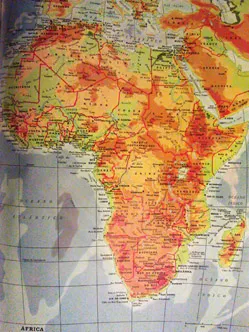How many Sub-Saharan African embassies are there in Warsaw? Unfortunately, only a few. You can find the flags of South Africa, Nigeria and Angola fluttering proudly in Śródmieście and Mokotów, whenever freezing weather doesn’t take their tropical temperaments away. DR Congo is present but somehow not there. The post doesn’t exist anymore and the officials work from their homes. Apart from the embassies there are a few consulates (Guinea, Senegal, Gambia, and Ghana). What was the situation like in the past? According to Wikipedia, permanent embassies came into existence in the 15th century and they were usually of Italian origin. France and Sweden introduced their embassies in the 17th century and Russia and Poland followed in the 18th century. An official from each embassy placed their national emblem at the embassy building.
When did Sub-Saharan Africa come to Poland? The answer is in 1930s – thanks to Liberia and Ethiopia. There were only those two embassies due to the fact that the whole of Africa was heavily colonised at that time.
What about the Polish diplomatic presence in Africa at the moment? Poland has its posts in every country of the Arabic-Berber part of Africa, namely: Morocco, Tunisia, Algeria, Libya and Egypt. That makes 5 countries out of 53 on the African continent. In the countries located south of the Sahara, the situation is much worse. There are only 5 Polish diplomatic posts amongst the 48 countries. They are called a “Big Five’’ and they are based in Angola, Ethiopia, Kenya, Nigeria and South Africa. It appears that they are the only countries with business links to Poland.
It’s worth mentioning that only two years ago the Polish presence in Africa was a little bit stronger. There was a Polish embassy in Senegal (Dakar) before Warsaw (the present Minister of Foreign Affairs – Mr Sikorski) decided to support only the “Big Five”. This is a shame, as citizens of Mali, Guinea, Sierra Leone, Gambia and Mauritania sorted out their visa arrangements in Dakar.
What’s the situation like at the moment? Senegalese people have to fly to Morocco, while the citizens of Mali and Burkina Faso need to fly to Algeria. What about students from Guinea, Benin, Ghana, Equatorial Guinea, Guinea-Conakry, Sierra Leone, Togo, Ivory Coast, Liberia or Cameroon? If they wish to study at Polish universities, they need to fly as far as to Nigeria. It’s enough to look at the map of western Africa in order to understand how much hardship those people have to endure. Flying from Guinea-Conakry to Nigeria is not easy.....
The Polish ambassador in Luanda is also accredited to the Democratic Republic of Congo, Gabon, the Republic of Congo, the Central African Republic and the islands of Sao Tome & Principe. The Polish ambassador in Nairobi deals with requests from Burundi, the Comoros, Madagascar, Mauritius, Rwanda, Seychelles, Somalia, Tanzania, and Uganda.
The ambassador in Pretoria opens his diplomatic umbrella over: Botswana, Lesotho, Malawi, Mozambique, Namibia, Zambia, Swaziland and Zimbabwe. As I mentioned before, the Polish ambassador in Rabat is also accredited to the countries like: Gambia, Guinea-Bissau, Mauretania, Cape Verde and Senegal.
Perhaps, Warsaw wanted to “give away” the rest of the countries, as French say. Most of the corresponding African diplomatic posts that are accredited to Poland are actually located in Germany’s capital – Berlin. Those are: Burkina Faso, Ethiopia, Ghana, Mali, Namibia, Niger, Senegal, Tanzania, Togo, Uganda, Ivory Coast, Zambia, Cape Verde and Zimbabwe. As you can see, it’s mainly Berlin that is competing with Warsaw.
On the other hand, Moscow is the place where you can find the embassies of Burundi, Chad, Guinea Bissau, Cameroon, Madagascar, Mauretania and Sierra Leone. The Kenyan embassy is located in Rome.
I cannot believe this is meant as “revenge” by the Polish government. There will be no more embassies in the Sub-Saharan Africa as other countries are not present in Warsaw. The only problem is that a businessman from Guinea can afford a flight to Nigeria in order to get a visa, while for a student this is much more difficult. A lot of students who just obtained their A levels more and more often choose Polish universities, as they meet high standards and are much cheaper then western universities. There are so many Polish diplomatic posts in North Africa as all those countries have been Poland’s business partners for a long time, and they are the most important tourist destinations in Africa for Polish people. In spite of this, the Polish embassies should have been distributed more evenly. Where is the logic in Mr Sikorski’s actions who assigned 9 countries of the western Africa plus Cameroon to the post in Nigeria? I cannot believe that there is so little Polish business in the whole of western Africa. I remember when I was a child, people in Dakar were talking about Polish ships and you could hear about Polish sailors buying big amounts of Senegalese tea called kinkeliba. But maybe they were Russians? As far as I know Poles used to renovate a harbour in the former capital of Saint Louis (at the mouth of a river Senegal). But maybe that’s just the story. Maybe Warsaw doesn’t have any business in the Sub-Saharan Africa anymore and prefers to buy second-hand from western companies. Everyone knows that’s more expensive. Now I understand why a mango (which is very common in Senegal, like apples in Poland) is so expensive in Hala Banacha.
Mamadou

















